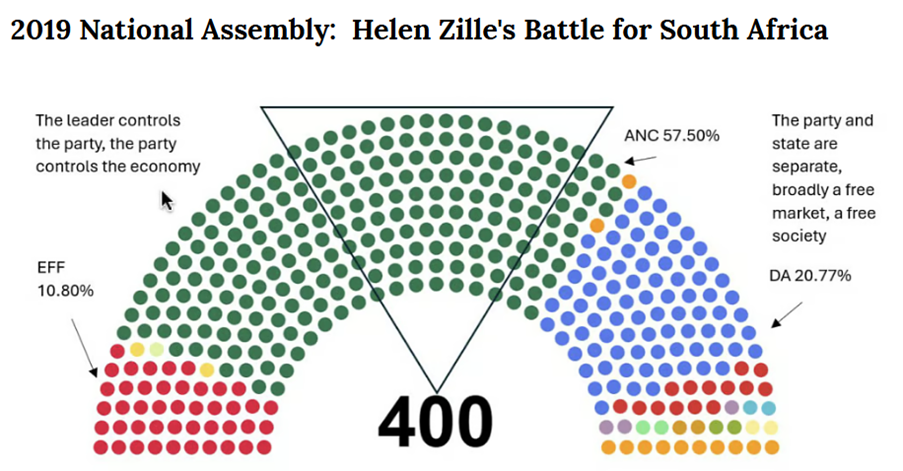Centrist parties the world over generally hold control of major cities.
Why South Africa’s Democratic Alliance (DA) does not hold control of Johannesburg is not a mystery. The party never quite got the electoral numbers. SA’s large city councils are not split into boroughs, and gaining control of a vast, diverse area is very difficult.
As author Richard Wilkinson states, if you have a workable majority, you can govern. Without it, you will find yourself in control of nothing and getting the blame for everything.
At a BizNews conference of yesteryear, current DA federal chairperson Helen Zille drew an illustration showing that parties on the right and centre of the spectrum believe in the free market and the rule of law.
Those on the far left believe the leader controls the party. The party controls the state. The state controls the economy.

The argument went that the DA should not govern with a far-left party for the sake of holding on to a council, province, or at national level.
The party will say that this was the key strategic error in its attempts to govern Joburg as a minority government from 2016 and again from 2021 – (when it gained 38% and 25%, respectively).
Indeed, those coalitions eventually fell, damaging the party’s credibility when every day became a battle to keep a multi-party alliance together.
Better not to be in government at all, then, than to lean on parties with an irreconcilable worldview.
In what it hopes will be third time lucky, the DA will struggle to explain those dynamics to ordinary people: ‘We did not have the numbers’.
Yet the history of coalitions in SA appears to support Ms Zille’s political science theory. DA local government (municipal) coalitions with the centrist Inkatha Freedom Party (IFP) – in the KwaZulu-Natal province – generally do well. In one example, the IFP-DA coalition in uMhlathuze (Richard’s Bay) has held together and won governance awards.
A key juncture
If South Africa succeeds into the 2030s, one could draw a line back to Ms Zille’s bid for Joburg mayoral candidate in 2026 as a key juncture on that road.
Could the DA finally lead a Joburg coalition of pro-market values? Or might it fall agonisingly short yet again?
If so, the DA would then seek an outright majority in the Gauteng provincial legislature in 2029. At that point, the ANC will have irreversibly lost SA’s three largest provinces.
This is the story of Cape Town and the Western Cape province (2006-2009).
Winning the Gauteng province would also mean the DA becomes the largest party at a national level.
Joburg, Gauteng, and SA are the DA’s to win. Lose it, and the DA could remain a party of some cities and some provinces.
The stakes are so high.
The devil is in the numbers
An April 2025 survey by the Brenthurst put the DA at 33% and the ANC at 32% in Joburg.
On that basis, for the DA to govern Joburg, a deal like that at the national level would have to take place, involving the two largest parties. Joburg DA councillor Martin Williams floated this in late 2024 as a preferable outcome, if the DA were to overtake the ANC.
As one revisits the DA’s coalition science, a deal with the ANC is not necessarily a strategic error.
For the same BizNews forum, I have written extensively on the political dynamics of the Gauteng province and the councils within it.
Yet it is still unclear to me if the Joburg ANC caucus is willing to do a deal with the DA.
High-profile candidacy
One wonders if Ms Zille has information that her high-profile candidacy could push the DA up to 42%, 43% or 45% in Johannesburg. That would avoid its having to rely on the ANC altogether (through the formation of a centre-right majority of ideologically compatible partners).
That could repeat the story of Cape Town in 2006, where she led.
In that election, the DA achieved 42% (PR ballot) and governed with a seven-party coalition.
Against the odds, that coalition lasted the full term. The DA won an outright majority in 2011, which it has held on to until the present day.
And so, the once invincible ANC, hopeless in opposition, may be heading for a similar fate in the City of Gold.
On a bad day, the DA may scrape 35%, and the ANC could do a deal with left-leaning parties and a host of small ones.
On a good day, the DA could get 42%-45%, and get over the line.
The DA could land above 40% if voters from small DA-breakaways return. And inroads among previous ANC voters would more than compensate for Joburg’s leak of suburbanites.
Institute of Race Relations (IRR) Researcher Nicholas Lorimer wrote how a centre-right alliance will probably get the numbers in Tshwane, but may fall short in Joburg.
Last shot
Yet this may well be the DA’s last shot at governing Joburg.
To the ordinary voter that would be ‘fool-me-once-shame-on-you-, fool-me- twice-, shame-on-me, -fool-me-three-times-and-there-will-not-be-a-fourth time’.
Johannesburg is home to a myriad of small parties, all of which may take one seat here or there.
One wonders if the ANC may be about to counter-attack. It can field good candidates when it wants to, but the Joburg / Gauteng ANC is deeply factionalised. The DA knows this well and may deal a blow in a ‘wedge city’.
Forward
The scale of Johannesburg’s deterioration is well known. There are assassinations, gang violence, broken water pipes flooding the title deeds office, trees growing from mid-street potholes.
“Rock bottom” one might say. In that scenario, ordinary people may vote en masse for a compelling alternative.
Capitalist-activist Rob Hersov says the DA’s record in fixing potholes and finances should elevate the party to the role of COOs of SA (Chief Operating Officers).
Although Johannesburg’s problems are deeper than those of Cape Town in 2006, there is a tailwind blowing behind a new administration.
Joburg is home to a number of well-resourced civil society movements, non-governmental organisations (NGOs) and private sector actors, prepared to work with a willing administration without charging a penny.
Easy wins
In 2023, IRR CEO John Endres said that easy wins for South Africa’s progress would be a government that works with these entities and not against them.
That is, for example, a city council administration which cooperates with world-leading private security companies to guard a sub-station from vandalism, rather than claiming that only the state police are allowed to operate.
Using an NGO-built app to report water leaks as a tool in the new mayoral chain armour is superior to snubbing NGOs as an inconvenience.
Residents’ associations, volunteer engineer alliances, transparency and whistleblowers’ organisations, and urban regeneration groups all sit ready to assist in what could become a case study for 21st century-regeneration. Indeed, the scale of modern regeneration can be truly astounding.
The data and lived experience suggest Johannesburg needs a new dispensation.
Boring administration will be as important as charismatic speeches with presidential-level security. Tact will be indispensable in identifying good people in the weeds of a broken system.
Audacious, daring, make or break it all! Maybe Ms Zille’s plan, back in the city of her birth, could be a masterstroke-swansong.
And she will say that all this will depend on her being given the numbers to get to work.
[Image: Supplied]
The views of the writer are not necessarily the views of the Daily Friend or the IRR.
If you like what you have just read, support the Daily Friend

